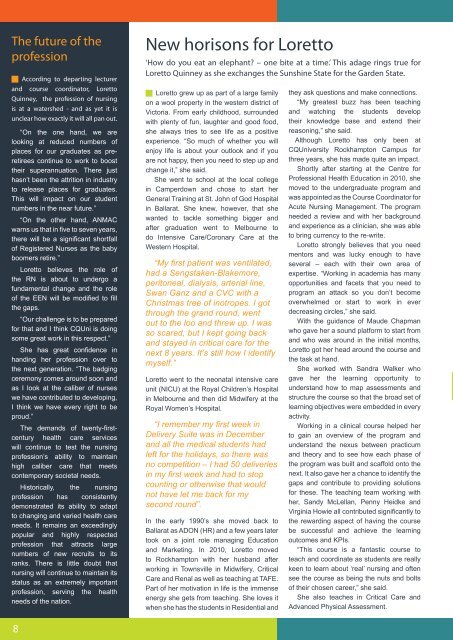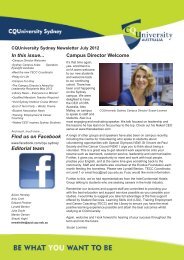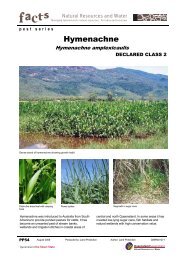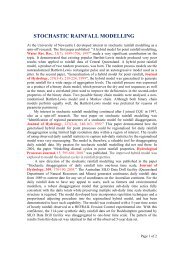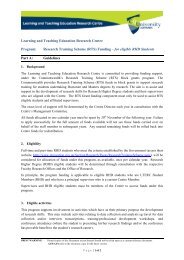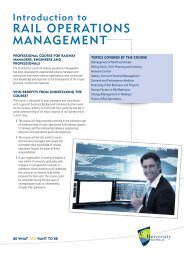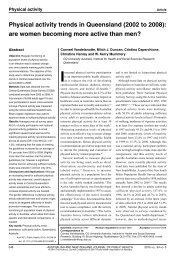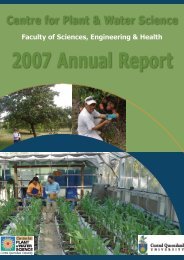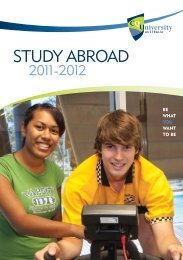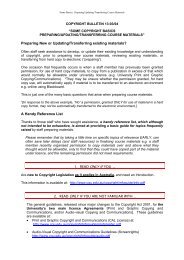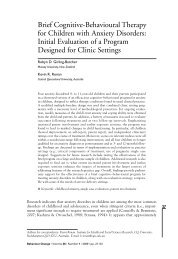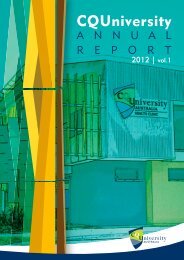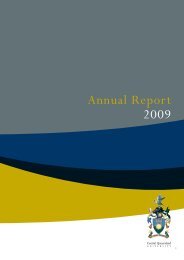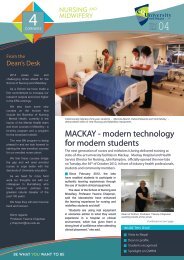4 Corners Newsletter - Vol 3 - Central Queensland University
4 Corners Newsletter - Vol 3 - Central Queensland University
4 Corners Newsletter - Vol 3 - Central Queensland University
Create successful ePaper yourself
Turn your PDF publications into a flip-book with our unique Google optimized e-Paper software.
The future of the<br />
profession<br />
According to departing lecturer<br />
and course coordinator, Loretto<br />
Quinney, the profession of nursing<br />
is at a watershed - and as yet it is<br />
unclear how exactly it will all pan out.<br />
“On the one hand, we are<br />
looking at reduced numbers of<br />
places for our graduates as preretirees<br />
continue to work to boost<br />
their superannuation. There just<br />
hasn’t been the attrition in industry<br />
to release places for graduates.<br />
This will impact on our student<br />
numbers in the near future.”<br />
“On the other hand, ANMAC<br />
warns us that in five to seven years,<br />
there will be a significant shortfall<br />
of Registered Nurses as the baby<br />
boomers retire.”<br />
Loretto believes the role of<br />
the RN is about to undergo a<br />
fundamental change and the role<br />
of the EEN will be modified to fill<br />
the gaps.<br />
“Our challenge is to be prepared<br />
for that and I think CQUni is doing<br />
some great work in this respect.”<br />
She has great confidence in<br />
handing her profession over to<br />
the next generation. “The badging<br />
ceremony comes around soon and<br />
as I look at the caliber of nurses<br />
we have contributed to developing,<br />
I think we have every right to be<br />
proud.”<br />
The demands of twenty-firstcentury<br />
health care services<br />
will continue to test the nursing<br />
profession’s ability to maintain<br />
high caliber care that meets<br />
contemporary societal needs.<br />
Historically, the nursing<br />
profession has consistently<br />
demonstrated its ability to adapt<br />
to changing and varied health care<br />
needs. It remains an exceedingly<br />
popular and highly respected<br />
profession that attracts large<br />
numbers of new recruits to its<br />
ranks. There is little doubt that<br />
nursing will continue to maintain its<br />
status as an extremely important<br />
profession, serving the health<br />
needs of the nation.<br />
New horisons for Loretto<br />
‘How do you eat an elephant? – one bite at a time.’ This adage rings true for<br />
Loretto Quinney as she exchanges the Sunshine State for the Garden State.<br />
Loretto grew up as part of a large family<br />
on a wool property in the western district of<br />
Victoria. From early childhood, surrounded<br />
with plenty of fun, laughter and good food,<br />
she always tries to see life as a positive<br />
experience. “So much of whether you will<br />
enjoy life is about your outlook and if you<br />
are not happy, then you need to step up and<br />
change it,” she said.<br />
She went to school at the local college<br />
in Camperdown and chose to start her<br />
General Training at St. John of God Hospital<br />
in Ballarat. She knew, however, that she<br />
wanted to tackle something bigger and<br />
after graduation went to Melbourne to<br />
do Intensive Care/Coronary Care at the<br />
Western Hospital.<br />
“My first patient was ventilated,<br />
had a Sengstaken-Blakemore,<br />
peritoneal, dialysis, arterial line,<br />
Swan Ganz and a CVC with a<br />
Christmas tree of inotropes. I got<br />
through the grand round, went<br />
out to the loo and threw up. I was<br />
so scared, but I kept going back<br />
and stayed in critical care for the<br />
next 8 years. It’s still how I identify<br />
myself.”<br />
Loretto went to the neonatal intensive care<br />
unit (NICU) at the Royal Children’s Hospital<br />
in Melbourne and then did Midwifery at the<br />
Royal Women’s Hospital.<br />
“I remember my first week in<br />
Delivery Suite was in December<br />
and all the medical students had<br />
left for the holidays, so there was<br />
no competition – I had 50 deliveries<br />
in my first week and had to stop<br />
counting or otherwise that would<br />
not have let me back for my<br />
second round”.<br />
In the early 1990’s she moved back to<br />
Ballarat as ADON (HR) and a few years later<br />
took on a joint role managing Education<br />
and Marketing. In 2010, Loretto moved<br />
to Rockhampton with her husband after<br />
working in Townsville in Midwifery, Critical<br />
Care and Renal as well as teaching at TAFE.<br />
Part of her motivation in life is the immense<br />
energy she gets from teaching. She loves it<br />
when she has the students in Residential and<br />
they ask questions and make connections.<br />
“My greatest buzz has been teaching<br />
and watching the students develop<br />
their knowledge base and extend their<br />
reasoning,” she said.<br />
Although Loretto has only been at<br />
CQ<strong>University</strong> Rockhampton Campus for<br />
three years, she has made quite an impact.<br />
Shortly after starting at the Centre for<br />
Professional Health Education in 2010, she<br />
moved to the undergraduate program and<br />
was appointed as the Course Coordinator for<br />
Acute Nursing Management. The program<br />
needed a review and with her background<br />
and experience as a clinician, she was able<br />
to bring currency to the re-write.<br />
Loretto strongly believes that you need<br />
mentors and was lucky enough to have<br />
several – each with their own area of<br />
expertise. “Working in academia has many<br />
opportunities and facets that you need to<br />
program an attack so you don’t become<br />
overwhelmed or start to work in ever<br />
decreasing circles,” she said.<br />
With the guidance of Maude Chapman<br />
who gave her a sound platform to start from<br />
and who was around in the initial months,<br />
Loretto got her head around the course and<br />
the task at hand.<br />
She worked with Sandra Walker who<br />
gave her the learning opportunity to<br />
understand how to map assessments and<br />
structure the course so that the broad set of<br />
learning objectives were embedded in every<br />
activity.<br />
Working in a clinical course helped her<br />
to gain an overview of the program and<br />
understand the nexus between practicum<br />
and theory and to see how each phase of<br />
the program was built and scaffold onto the<br />
next. It also gave her a chance to identify the<br />
gaps and contribute to providing solutions<br />
for these. The teaching team working with<br />
her, Sandy McLellan, Penny Heidke and<br />
Virginia Howie all contributed significantly to<br />
the rewarding aspect of having the course<br />
be successful and achieve the learning<br />
outcomes and KPIs.<br />
“This course is a fantastic course to<br />
teach and coordinate as students are really<br />
keen to learn about ‘real’ nursing and often<br />
see the course as being the nuts and bolts<br />
of their chosen career,” she said.<br />
She also teaches in Critical Care and<br />
Advanced Physical Assessment.<br />
8


